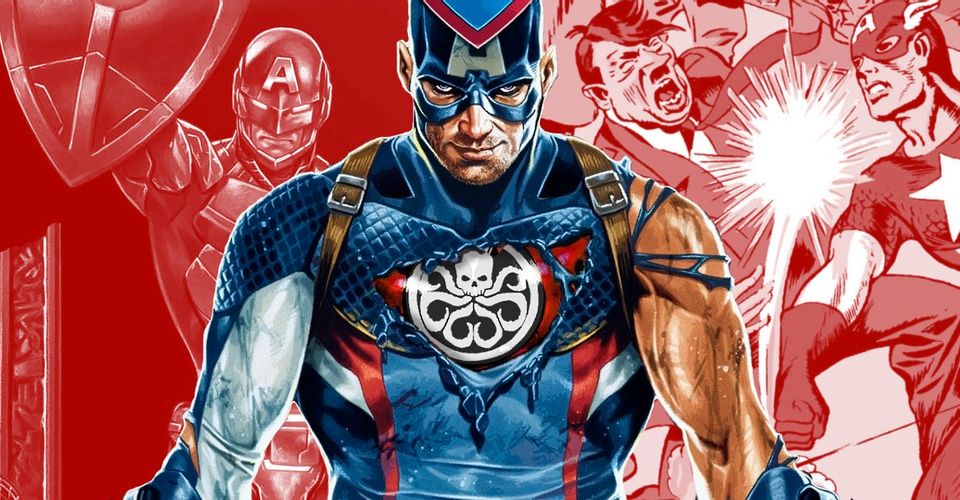Marvel’s Biggest Captain America Mistake is Separating Hydra from Nazis

While Captain America is one of Marvel Comics’ oldest superheroes, and perhaps one of the most important characters in comics history, Marvel has oddly handicapped the character as of late. As the de facto political superhero, Captain America rose to fame during World War II fighting the enemies of the United States – chief among them, the Nazis of Adolf Hitler’s Germany. Captain America’s ability to criticize America’s faults in addition to championing its ideals led to the character’s long-lasting appeal, carrying him into the 21st century while other patriotic heroes such as The Shield, Fighting American, Miss America and Liberty Belle were left behind.
In recent years, however, the higher-ups at Marvel Comics (and Marvel Studios by extension) have gone out of their way to erase the Nazis from Captain America’s long list of foes. The company now insists that Captain America fought the organization Hydra during World War II instead of the actual threats faced by America at the time. This naturally raises the question: why will Marvel no longer allow Captain America to fight Nazis?
Captain America Comics #1: Socking Adolf On The Jaw

Conceived in 1940 by writer Joe Simon, Captain America almost didn’t make it to print. Timely Comics producer Martin Goodman was so impressed with the character that he ordered the creation of a solo series – something quite rare at the time, as Golden Age heroes often debuted in anthology books. Artist Jack Kirby raced against time to pencil the entire book by himself before the deadline (Simon had hired two other artists, but Kirby insisted he could do the work alone). Captain America Comics #1 hit store shelves on March 1, 1941 – and was immediately met with controversy. The famous image of Captain America punching Hitler in the face (drawn by a Jewish artist, no less) prompted death threats from Nazi sympathizers – this was notably before America officially entered the conflict – but the book sold incredibly well, making Steve Rogers a household name during the war.
Unfortunately, the post-war era wasn’t nearly as kind to the star-spangled super-soldier. Nazi Germany, Imperial Japan and Fascist Italy were all soundly defeated, leaving Captain America without a proper enemy; especially as the Red Skull, Captain America’s arch-nemesis who worked for Hitler, served little purpose after the real Hitler’s death in 1945. With anti-Communist fervor brewing in the United States, Steve Rogers was briefly rebranded in 1954 as “Captain America: Commie Smasher!” in the hopes that a more topical enemy would increase sales. But the more morally-nebulous Cold War didn’t easily lend itself to the medium (at least at the time), and the Captain America character began a long hiatus from comics, only reemerging ten years later in 1964.
Hydra: The Family-Friendly Nazis

Now owned by Marvel Comics, writer Stan Lee rewrote Captain America’s history: in-universe, the character disappeared in 1944, frozen in suspended animation (the so-called “Commie Smasher” wasn’t Captain America at all). Lee got around the lack of Nazis by creating Hydra, a paramilitary organization with aspirations to take over the world. Led by Baron Wolfgang von Strucker, and later the Red Skull, Hydra’s origins predate Nazism – the cult is thousands of years old and founded by aliens – but quickly supplanted Nazis as a quasi-Fascist organization for Captain America to fight. It wasn’t long before Marvel retconned Captain America’s pre-revival history again – but this time, Hydra existed as a branch within Nazi Germany. This was taken to a logical extreme in the 2011 film Captain America: The First Avenger, in which Captain America seemingly doesn’t fight a single Nazi soldier. Indeed, the Red Skull in the film outright attacks Nazi officers, justifying his actions by saying “Hydra could no longer grow in Hitler’s shadow.”
Over the years, Marvel has made Hydra more and more distinct from the Nazi Party: their salute uses two closed fists instead of one open hand, their octopus symbol replaces the swastika, and rather than pledge their allegiance to Hitler, they simply shout “Hail Hydra!” as a rallying cry. Perhaps the most glaring distinction is a glaring omission: the complete absence of any ideology other than garden-variety totalitarianism. Hydra doesn’t seem to care about eliminating “untermenschen” – the Nazi term for non-Aryans. They simply desire power. Thus is the reader presented with a curious case of Schrödinger’s Nazis: because of their in-universe history, Hydra are Nazis, and because of their lack of adherence to eugenics, they are not.
The Problem with Erasing Nazis

In 2017, buildup to the Secret Empire event shocked the comic book world when Captain America was revealed to be a Hydra sleeper agent. The character created by Jewish writers proclaiming “Hail Hydra” was seen by many readers as horrendously disrespectful to Captain America’s history. In a 2017 interview with IGN.com, writer Nick Spencer said, “[Hydra’s] ideology is different from what you would traditionally say is Nazis…they’re not exactly, in the continuity, Nazis.” It’s an explanation that makes Hydra’s separation from the Nazis explicit in Marvel’s modern age, but one that also strips them of the real-world philosophy that it’s so valuable to see Captain America fighting against.
As horrific as Nazi rhetoric is and was, showing its flaws and defeat is perhaps Captain America’s most important function in pop culture. To fully replace the Nazis with Hydra is to effectively declaw Nazism itself and to remove commentary that is still regrettably needed in the modern day. Captain America has long been defined by his opposition to Nazi ideology and goals, but Hydra is in turn defined by its opposition to Captain America, creating a blurry photocopy of villains who fight freedom and equality but eschew real-world context unless convenient to a given story. This hurts both readers, who deserve a Steve Rogers connected to real-world issues, and Captain America as a character, who ultimately ends up combating a reflection of something real and becoming one in turn, standing for abstract values that are easier to bend or misread than his opposition to specific, real-world ideologies and events.
Marvel’s gradual shift away from Hydra’s roots only makes Captain America less relevant and his stories less able to bring artistic truth to real-world scourges. Characters like Deadpool‘s Bob, Agent of Hydra, show the extent to which the organization’s meaning has changed, as readers are encouraged to develop a soft spot for a henchman who, after all, is just a small cog in a generically evil organization. While the separation between Hydra and the Nazis happened relatively gradually, it’s a process that Marvel would do well to reverse – something that’s being attempted in series like Non-Stop Spider-Man, which calls out the Nazi roots of Baron Zemo’s new Hydra, but is still uncommon in big-selling, main-universe stories and, crucially, Captain America comics.
Source: IGN.com

















